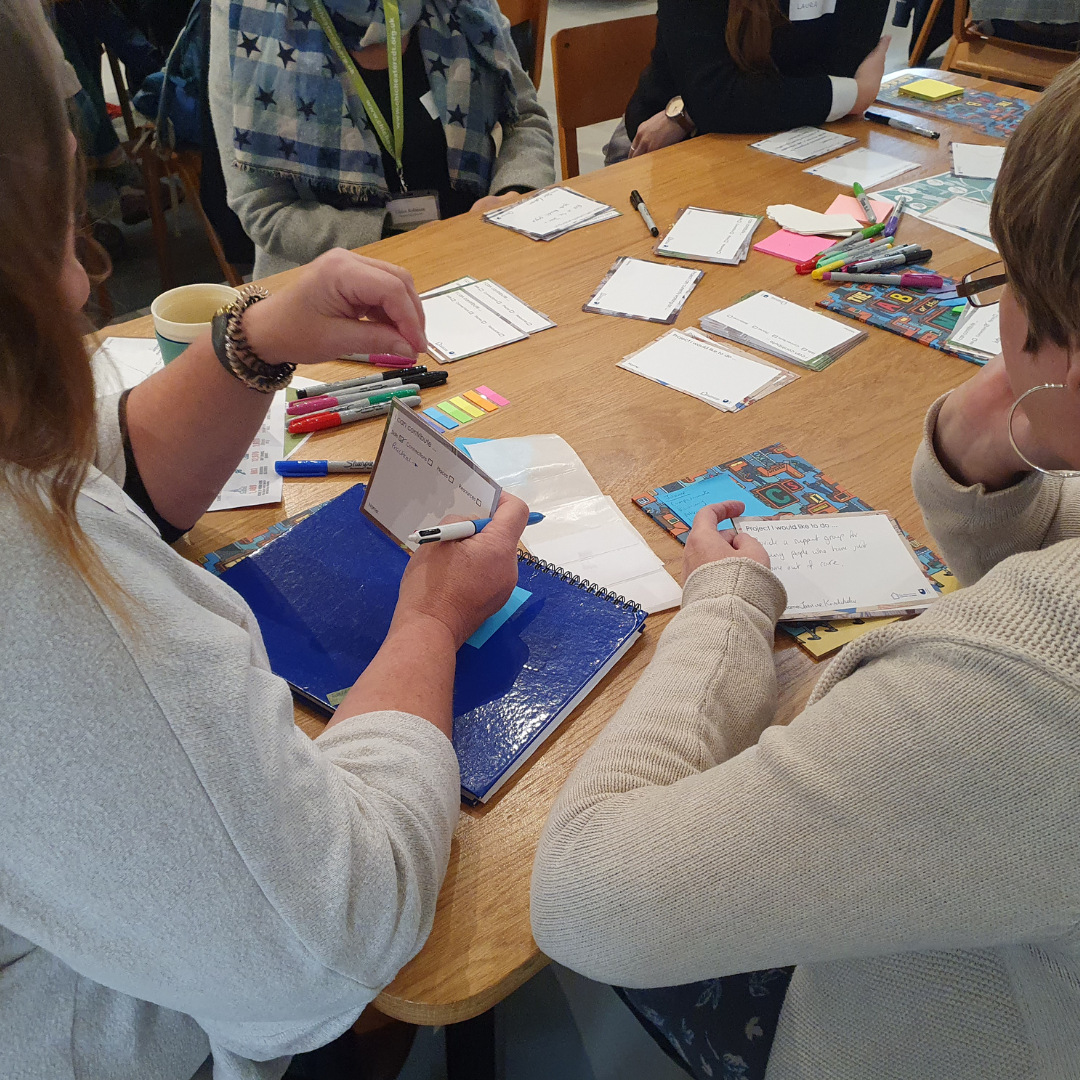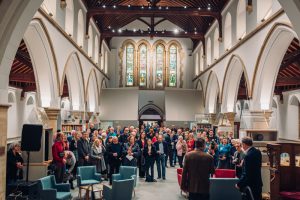- Introduction
The second cross-pollination workshop to be held at Graylingwell Chapel, on June 12th 2024, brought over 30 key stakeholders in the Chichester district together again, hosted by Chichester Community Development Trust. Focusing initially on the key challenges, assets and opportunities around young people and those who are socially isolated, the group also shared information and updates on their own organisations, and projects – those underway, and those they would love to see happen. The purpose of the event was to:
- Further develop the existing community asset mapping initiated at the first workshop – the map, with assets listed can be found here.
- Better understand the challenges facing the district’s young people and socially isolated
- Share knowledge of assets, projects, people, places and aspirations for community delivery across the region, specifically:
- Projects being worked on
- Projects participants would like to see delivered
- Resources that could be contributed by participants, including skills; connections; places; or time
Outcomes from these discussions are shared below, along with participants details and emails so that collaborations and connections can be borne out of the meeting, and shared projects can deliver greater social impact in the future. In addition, a light-hearted opening session invited stakeholders to share details of their favourite local restaurants; recipes; books; and TV series or films to break the ice amongst those who didn’t know each other. To benefit from their recommendations, look at their suggestions in the appendix.
- Community Assets – Young People
Those attending first heard extracts from a focus group of young people from the district that are struggling to stay in school. They had discussed what they felt were their greatest challenges at this time, and what they felt would be of greatest benefit to them in the community. The young people voiced strongly the anxiety that school brought them, and the challenges that such an environment caused. With regard to hopes for the future, they spoke of their need for a place/places to just hang out with no activity scheduled – just somewhere to be, both indoors and outdoors. They expressed a real interest in basketball courts; a boxing club; and accessible, affordable or ideally free transport to travel to spaces in which they felt safer, stating they would then use more of the community assets available – one young person referencing a scheme in Europe where bus travel is free for under 16s.
Once opened to the wider stakeholder group to review and identify specific challenges that young people face, which need addressing the main issues identified included:
- A sense of isolation
- Those in rural areas feel excluded and can’t access city-based assets
- Insufficient safe cycling making it difficult to travel to events, activities or spaces that are put on for young people
- Lack of affordable transport – buses or trains, with costs continuously escalating, leaving many unable to access them
- A lack of safe spaces to meet and just ‘hangout’ resulting in isolation, or hanging out in the car parks or other spaces across the city
- Mental health crisis with extremely long waiting times for any support unless in absolute crisis
- Anxiety that has escalated profoundly through the impact of social media pressures, and the still unravelling after-shock of COVID
- Affordability of services – membership to sports clubs and the associated costs of kit etc; after schools clubs and associated costs
- Limited support in school for young people with SEND or EBSA
- There is a need for duplications of service delivery for young people. For example, it’s not enough to say we have one boxing club – if that’s used by one group of young people that others are intimidated by, they will not use that service. Young people need choices and variety in an ideal world.
- Lack of social media presence from services for young people on platforms that they use – the content is not in the language or places that they would engage with so the people who need it most often don’t know it’s there. Companies, organisations and charities tend not to use SnapChat or TikTok etc., which is where the young people are.
- Sense of being alone, and with no sense of hope or support
- Lack of training or job opportunities to give young people a sense of purpose or achievement, particularly if they are struggling in school. The employment regulations make this quite hard for local businesses to support.
- Technology – it’s overuse, and for some it’s inaccessibility if facing financial deprivation
- Lack of support networks – friends of family
- Prejudice against young people – an assumption by the wider community that they are ‘trouble’, ‘dangerous’, ‘not engaged’.
- There’s not enough out there for 14–18-year-olds to get involved in. When they feel too old for youth groups but can’t yet go to the pub there are few spaces for them to be in during the evening, where they can be safe and feel connected.
Whilst there are many challenges there are also a great deal of assets in projects, people and places that are providing excellent support services for young people, and the take-up for many is good. It was agreed that shared communications and new and better ways of reaching young people are needed, to ensure that those in the greatest need feel there are options for them to encourage making good choices.
Assets highlighted as being available and designed to support young people were:
- The Bell Tower Drop In – open 3:30-5:30pm, Monday to Friday for 11–17-year-olds
- Young People Shop – YPS is a charity that offers free and confidential support for young people aged between 11 and 25 who are struggling with their mental health. We are based in Chichester but aim to ensure that every young person in Chichester and Arun Districts can access help and advice when they need it.
- Chichester Family Hub – Family hubs offer a range of support, information and guidance to parents, carers and young people as part of Early Help.
- The Chichester Shed, a new-build space opened this year, the Shed is available for community groups, youth service providers, and organisations developing intergenerational connections. Activities include ‘Yoof Group’, youth ambassadors, youth kitchen, Sonic Space music sessions for those living with anxiety and neurodiversity and more
- Chichester Boys Club – provide a safe and welcoming environment for young people and adults to enjoy and participate in interesting and fun activities including boxing, home education group, drop in table tennis and bridge sessions and more.
- Chichester Lions Club – provides some funding projects and volunteer groups for community projects
- Chichester Welfare Trust – Provides support to individuals and families that are facing financial deprivation
- Cobnor Activity Centre – An independent charity based in Chichester Harbour whose purpose is to provide high quality outdoor experiences to make life better for everyone – and in particular for young people – both on and off the water.
- CYE – Transforming lives through outdoor activities in Chichester harbour since 1985.
- The Goodwood Education Trust – connects children and young people with nature, particularly those who are disadvantaged or vulnerable. They offer free school farm trips for schools with a high percentage of Free school meals; EAL or SEN children; they have part-funded forest school; free community woodland days and HAF programmes in the summer.
- Chichester Festival Youth Theatre – their seven groups across West Sussex offer weekly sessions where young people can discover skills, they didn’t know they had, make friends and “laugh until their sides hurt”* (*direct quote from a member). Their groups are held in Billingshurst, Bognor Regis, Chichester, Horsham, Littlehampton, Midhurst and Worthing.
- The Jam Café – Based in heart of Chichester Creative Beatz – Jam CIC, is a not-for-profit community café offering community, coffee and craft!
- Oving Parish Council Youth Club – held at Jubilee Hall, Oving, meeting every Wednesday
Others commented on approaches that they felt would help to provide support to young people. These included:
- Enabling young people to trade skills where it was not possible to provide them with payment because of their age
- Greater alternative provision of education outside the traditional model
Sharing of projects & resources
Following discussions about the challenges faced and assets available to young people, participants then shared details of projects they are working on; would like to see and be involved with in some way; and resources they had available to share – in the realm of skills, connections, places and resources. The cards highlighting individuals’ contributions can be seen on the digitised postcards at the following links:
Projects I am currently working on
- Community Assets – Socially Isolated
The second phase of the workshop looked at challenges facing those who are socially isolated. Many participants emphasised the importance of recognising that this is not a category exclusive to either the elderly, or those who are living on their own. It is a state that many can feel regardless of circumstances. Social isolation is a state in which the individual lacks a sense of belonging socially, lacks engagement with others, has a minimal number of social contacts, and they are deficient in fulfilling and quality relationships. Luke Bower, Senior Community Developer at Age UK for Chichester and Arun then stood up to say a few words about their experience of isolation amongst the over 50s, and shared the following insights. When opened to the wider group, key challenges that the participants identified were:
- Job adverts don’t appeal to the socially isolated, often leading with phrases including, ‘exciting opportunity’, ‘join this energetic team’ – social anxiety would make these options overwhelming. It’s important if a job can be done quietly and discreetly to make that known. Jobs don’t always have to sound ‘exciting’
- Many are finding that they reach pensionable age, and they can’t afford to be out of work, but lack the confidence or younger appeal many employers look for
- Language and attitudes can be excluding in information, materials, employment and other aspects of life, with modern expressions and terms used that would be unfamiliar to some – language should always be considered for accessibility to those that might not be socially engaged
- Online applications for events, activities, jobs or volunteering opportunities may be off putting for those that are digitally disadvantaged
- New spaces and places can be too intimidating to visit – including content on websites and materials such as images of the space, or video tours of the entrance and facilities can be very reassuring
- Caring responsibilities impact people of all ages, and significantly limit the ways in which they can engage in community activities. To reduce social isolation for this community more needs to be done to provide respite support or activities in which you can bring those you’re caring for.
- An overwhelming lack of confidence – that includes people not living alone, but who do not feel able to engage with events, activities or people outside of their own house making them feel a prisoner in their own home
The group then discussed assets of people, projects or places that are available within the Chichester district to support those facing social isolation. These included:
- Age UK – offering home visits, cafes, beauty and holistic therapies and advice on how and where to get care, and avoid scams and frauds.
- Graylingwell Chapel – a space to connect including free sessions such as Stitch club, community café, IT café and Stories and supper for young families.
- The Midhurst Hub
- UKHarvest – a space for those facing financial deprivation to access fresh food for a small donation. Also, an opportunity for those facing social isolation to engage and chat with members of the community.
- Mens Sheds – spaces for those (men and women) feeling socially isolated where they can meet with others who share a love of making, mending and building things. Nearby ‘sheds’ include The Chichester Shed on Keepers Green; Chichester Mens Shed on Blackboy Lane; Southbourne Mens Shed; Emsworth Mens Shed; and Littlehampton and District Men’s Shed West.
- Community Outreach at Chichester Baptist Church, including sessions for dementia support at Sage House for young carers, male carers and people living with dementia
- Goodwood Education Trust – Activities include ‘Forest Fridays’ – monthly free sessions for people with Aphasia (a communication disability leading to social isolation).
- Tuppeny Barn – including veterans projects (exclusive to female veterans), flower farming social and horticulture therapy. There is no age limit and is free at the point of entry. Soul & Thrive is for over-19-year-olds facing socially isolation, feeling vulnerable or living with mental health issues.
- Hourglass – the UK’s only charity focused on the abuse and neglect of older people, we staff a free-to-call helpline. It’s an absolute lifeline for older men, women and their families suffering from the five forms of abuse: physical, psychological, financial, sexual or neglect.
- Choose Work – a service within Chichester District Council supporting people back into work, with a focus on those who are socially isolated. Those not feeling up to a meeting in the Council offices can arrange for the team to meet them in a public space of their choosing, or near their home if transport is an issue.
- Chichester Festival Theatre Buddy scheme – CFT’s friendly Buddies are a team of trained volunteers who offer a free companion service for audience members.
- My Sisters House – supporting victims of domestic abuse, specifically adults, or mothers and children aged 7-14 with therapeutic approaches, and NSPCC accredited courses. The adult domestic abuse service is for people aged 16+.
Sharing of projects & resources
Following discussions about the challenges faced and assets available to those who are socially isolated, participants provided the following information on projects they were working on; ones they would like to see; and resources they could contribute:




